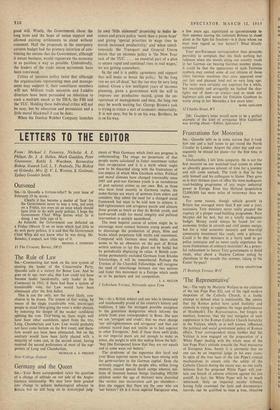Germany and the Queen
S1R,—Your Bonn correspondent raiscs the question of a change of attitude on our side of the Anglo- German relationship. We may have been goaded into change to achieve technological advance in Britain but we still hang on to stereotyped judg- ments of West Germany which limit any progress in understanding. The image we perpetuate of that people seems calculated to foster resentment rather than co-operation and it is a myth which ought now to be discarded along with the frustrations of lost empire of which Miss Gainham writes. Political and moral climates have changed irrevocably since
1945 and post-war German youth is as incredulous of past national crimes as our own. But, as those who have lived recently in Germany realise, the under-thirties are weary of sermons from elders and outsiders; they admit the need for a changed social framework but want to be told how to achieve it. Self-righteousness and arrogance puzzle and alienate those groups as much as they do British youth, and hard-earned credit for moral integrity and political intervention is quickly squandered.
The most hopeful course of action might be to encourage more contact between young people and to discourage the production of plays, films and books which perpetuate folk myths and resentment. Compared with German mass media there often seems to be an obsession on the part of British writers anxious to lay this ghost not by burial but by periodically displaying its relics. A British com- mittee permanently excluded Germans from Rhodes Scholarships, it will be remembered. Perhaps the Trustees of the Churchill Fellowships will recognise the need of interchange between our two nations and foster this movement in a Europe which needs us to be partners and not competitors.


































 Previous page
Previous page